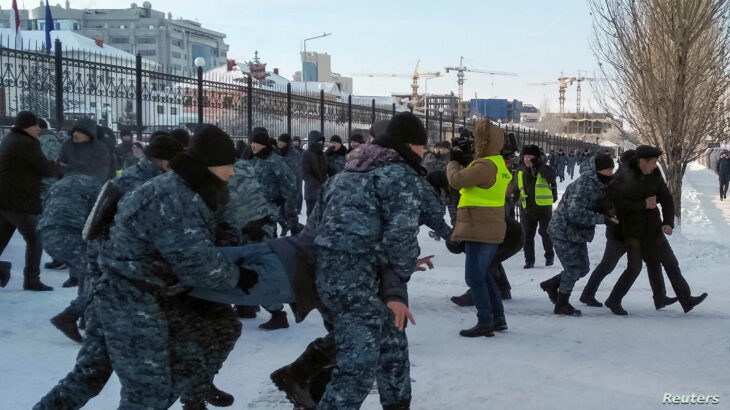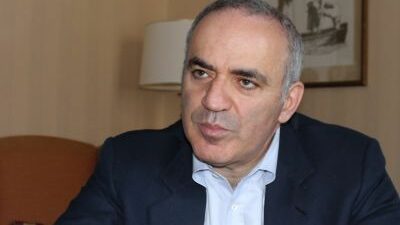Security officials have moved in for the second time in hours to detain dozens of opposition and civil rights activities in Kazakhstan as they rallied…

Security officials have moved in for the second time in hours to detain dozens of opposition and civil rights activities in Kazakhstan as they rallied to call for increased rights and the release of all political prisoners.
RFE/RL correspondents said that police detained at least 50 protesters in the capital, Nur-Sultan, and some 40 demonstrators in the Central Asian nation’s largest city, Almaty, on Dec. 16, which is Kazakhstan’s Independence Day.
The Dec. 16 protests also coincide with the 33rd anniversary of mass anti-Soviet demonstrations in Kazakhstan’s former capital, Almaty, known as Zheltoqsan (December), and the eighth anniversary of a deadly police crackdown against protests by oil workers in the southwestern town of Zhanaozen.
Protesters in Nur-Sultan held placards saying, “Zhanaozen — Zheltoqsan. We Will Never Forget, Never Forgive.” The demonstrators also demanded that Dec. 16 be marked as a day of mourning.
A representative of the city administration tried to persuade the protesters to leave the site, saying that the gathering had not been sanctioned by the authorities and therefore was illegal, but the crowd ignored his calls.
In Almaty, protesters chanted, “Wake Up, Kazakhstan,” “Kazakhstan Without Nazarbaev” and, “Old Man, Go Away!”
President Nursultan Nazarbaev, who ruled Kazakhstan for almost 30 years, unexpectedly resigned in March and picked current President Qasym-Zhomart Toqaev as his replacement. Nazarbaev continues to control social, economic and political spheres by leading the country’s ruling Nur-Otan party and the influential Security Council.
Toqaev formally won election as president on June 9 in a vote that international observers said was marred by the “detention of peaceful protesters and widespread voting irregularities on election day [that] showed scant respect for democratic standards.”
The demonstrators in Almaty demanded democratic reforms in the country, saying that local governors and judges must be elected, not appointed by the government.
Almaty officials also called on the demonstrators to stop the rallies because they were unsanctioned, but the protesters ignored them.
Early in the morning of Dec. 16, about a dozen people, including journalists, were detained by police, while last week at least 20 activists in Nur-Sultan and Almaty were arrested and handed jail terms of up to 15 days on charges of not obeying police orders and holding unsanctioned rallies earlier this year.
The opposition Democratic Choice of Kazakhstan (DVK) movement established by Mukhtar Ablyazov, a fugitive tycoon and opposition politician, had announced plans to organize rallies in the two cities and elsewhere in Kazakhstan.
A court in Kazakhstan has banned the DVK movement, branding it an extremist organization. The move was criticized by the European Parliament as politically motivated.
In its latest report on Kazakhstan, Human Rights Watch (HRW) said there “no meaningful improvement to Kazakhstan’s poor human rights record in 2018.” HRW said authorities did not allow peaceful protests that criticized government policies.
Source: VOA



